This article was co-authored by Noel Hunter, Psy.D. Dr. Noel Hunter is a Clinical Psychologist based in New York City. She is the director and founder of MindClear Integrative Psychotherapy. She specializes in using a trauma-informed, humanistic approach for treating and advocating for people diagnosed with mental disorders. Dr. Hunter holds a BA in Psychology from the University of South Florida, an MA in Psychology from New York University, and a doctorate in Psychology (Psy.D) from Long Island University. She has been featured in National Geographic, BBC News, CNN, TalkSpace, and Parents magazine. She is also the author of the book Trauma and Madness in Mental Health Services.
There are 16 references cited in this article, which can be found at the bottom of the page.
This article has been viewed 9,125 times.
Dissociative Identity Disorder (DID) is diagnosed when a person experiences uncertainty about who they are. They may have several different identities and memory problems when switching between identities.[1] [2] Previously called multiple personalities disorder, the person may experience reality through different lenses or characters. If you have a loved one with DID, it can be difficult to know how to be helpful and supportive. Express a desire to understand them, support them through treatment, and encourage their healthy lifestyle. When supporting a loved one with DID, remember to take care of yourself and prioritize your own well-being.
Steps
Understanding Your Loved One
-
1Do some research. One way to help your loved one is to better understand them. Learn about DID and how it affects people, but steer clear of any fictitious or sensationalized accounts since DID is often incorporated into books and movies. This can help your loved one feel understood while it can also help you identify DID symptoms and how to cope with them.[3]
- Every person with DID is different, and there are no “rules” for what DID can look like. Some people experience minor shifts while others experience major changes in their state.
-
2Ask about their experiences. Asking about your loved one’s experience with DID can show that you’re interested in learning about what they go through and it can help you better understand them. Ask questions in a respectful way, when your loved one is comfortable and willing to talk. Show an interest in them and understanding them.
- Ask, “What it is like to have DID? What is it like to switch between alters? Do you feel confused?"
- You could also ask, "What would make it easier for you? How can I help?”[4]
- Keep in mind that not all people with DID will understand their experiences, and they may not even recognize that they have a disorder. Consider asking them first, but also keep in mind that you may need to consult with a family member or mental health professional.
Advertisement -
3Recognize the effect on memory. While many people associate DID with changes in personality, the more important aspect to keep in mind is how DID affects memory. People are not born with DID or inherit it genetically, rather, it is learned throughout childhood as a way to cope and restrict memory access to trauma.[5] [6] Unfortunately, the memory loss can apply beyond trauma into other situations.
- If your loved one is scared or confused by memory loss, gently fill in some gaps. Introduce yourself and tell them where they are and what they are doing.
-
4Create safety for your loved one. Because DID involves having disjointed states, it can feel destabilizing for someone with the disorder. Help your loved one feel more stable by creating safety in their environment. Speak calmly and answer questions matter-of-factly.[7] Have an object that the person carries with them at all times, and integrate the object with each alter. Or, use a phrase with each identity to help create safety and comfort.
- For example, say, “I am someone who loves you and wants to support you.”
- The most important thing to do is to make sure they feel safe and happy and that they are not in any distress or fear. Don’t feel like you need to force them to reorient with reality if this upsets them. Let their mental health professional help them with this and follow any direction that they give you.
Maintaining a Healthy Relationship
-
1Keep your own boundaries. It can be difficult to know how to have boundaries with someone with DID. However, not enforcing boundaries can lead to making your own needs less important or paying less attention to them. This can end in resentment or enacting an imbalanced relationship.[8] [9] You may need to separate yourself if your loved one is experiencing a particularly mean alter, or have limits to what behaviors you will tolerate from an alter. For example, if your loved one becomes violent, leave the situation.
- Ask yourself, “What are some needs I have that I need respected? How do I do that with my loved one?”
- Make sure to enlist the help of a variety of caregivers to help give you breaks when you need them. This will help to prevent burnout.
- If your loved one has a history of violence, then make sure to let someone know when you will be spending time alone with them and take other precautions to keep yourself safe.
-
2Don’t take things personally. Part of DID is switching self-states with no integrated sense of self.[10] For this reason, an alter (or different state) may not recognize you or may not understand your relationship. This can be especially difficult if the person with DID is your child, partner, or sibling. Do your best to remember that their actions toward you while in a different state are not personal.[11] Take some deep breaths or disengage from the interaction.
- When you begin to feel upset, remind yourself, “My loved one has DID, and they cannot help their switching. It has nothing to do with me.”
-
3Show kindness and empathy. People with DID tend to have a history of abuse and trauma, particularly during childhood.[12] [13] Even when you feel frustrated with the person, recognize the extreme circumstances this person likely endured as a child and open your heart to compassion. When you feel angry or upset by their behavior, take a pause before reacting.
- Ask yourself, “Is there a way I can respond that shows love and kindness? How can I respond more compassionately?”
Supporting Your Loved One in Treatment
-
1Encourage treatment. If your loved one is not in treatment, talk about the benefits of seeing a therapist to help with DID. Offer to help in finding a therapist who specializes in treating DID. Go with your loved one to their first appointment or offer to drive them to weekly appointments. Treatment is an important part of working through DID, so any encouragement you can send your loved one’s way to get therapy can help.[14]
- Treatment can help to relieve symptoms of DID and work to integrate all alters into one unified identity, although this may not always be possible. Therapy can help your loved one have a safe place to talk about painful memories and trauma. Skills like positive coping and improving relationships can be learned.[15]
- Decide how involved you want to be in your loved one’s care. Also, keep in mind that you can share information with the therapist that you believe is important, but the therapist cannot share information about your loved one’s sessions with you.
-
2Attend family therapy. Family therapy is a great way to show your support for your loved one and participate in their treatment. This helps family members to learn about DID and how it affects the person and the family. Family therapy can help family members to spot signs of recurrence and deal with alters more peacefully.[16]
- Ask your loved one if they would like support from the family through family therapy. Say that you’re willing to learn about the disorder and help them with the assistance of a therapist.
- Make sure that you are careful about what family members are involved in your loved one’s therapy. It is important to protect them from their abuser(s), so it might be wise to exclude certain family members.
-
3Keep an eye out for suicidal tendencies. Some people with DID feel suicidal and have a difficult time coping with their disorder. Let your loved one know that you are there for them if they need help or feel suicidal.[17] Let them know they can reach out to you without fearing judgment and that you just want to help. Encourage them to get treatment right away.
- Some warning signs of suicide include talking about killing themselves, selling their possessions, increasing alcohol or drug use, feeling like a burden to others, socially withdrawing from friends and family, and acting out of control.[18]
- Talk with your loved one’s support system and mental health professional to develop a plan for suicidal ideation that is tailored to your loved one. Make sure everyone understands it and is on the same page about what to do in those types of situations.
- If your loved one is suicidal, call emergency services, go to your local emergency department, and get in touch with their therapist or treatment team.
- You can also call a suicide helpline, such as 988 in the USA (can also be reached via text), 116 123 in the UK, and 13 11 14 in Australia.
-
4Remember that identity integration may not always be possible. Some people with DID may not be physically or mentally able to “fuse” into a single identity, even with professional help. If this is the case for your loved one, try to shift your goals to reach a “resolution” between different identities. This means coordinating enough among the different identities so your loved one can function and live a safe, healthy life with their different alters.
- You and your loved one should seek professional help to reach this cooperative resolution.
Encouraging a Healthy Lifestyle
-
1Practice meditation together. Meditation has many positive health benefits, including improving immunity, decreasing anxiety, depression, and stress, increasing positive emotions and improving compassion toward others.[19] For people with DID, meditation can help to better tolerate their dissociative symptoms. It can also help with bringing awareness to their internal states.[20] Encourage your loved one to meditate with you regularly.
- Practice meditation together. Join a meditation group or spend some time each day in meditation together. Practice bringing your awareness to your breath and the present moment for 5-15 minutes each day.
- For more information, check out How to Do Mindful Meditation.
-
2Support healthy choices. Maintaining healthy habits is an important part of balancing mental health. In addition to DID, some people experience depression, anxiety, or other psychological disorders that can contribute to feeling unwell. Encourage your loved one to keep healthy habits, such as eating healthy foods, exercising regularly, managing stress, and getting good sleep each night.[21] Encourage your loved one to take care of their needs each day and prioritize their health.
- Offer to exercise with your loved one by going on regular hikes, joining a fitness club, or biking together. Cook meals together to encourage healthy eating.
- You may also want to ask if your loved one needs help managing their schedule and medication regimen.
-
3Discourage substance use. Many people with DID also experience substance abuse or dependence.[22] While the substances may offer temporary relief of symptoms, they often cause long-term problems and worsens mental health.[23] If your loved one has a substance problem, encourage them to get treatment. Depending on severity, look into inpatient or outpatient treatment programs. It can be difficult to treat DID without treating substance problems alongside or beforehand.
- For more information, check out How to Deal With a Drug Addicted Family Member or Loved One.
Expert Q&A
-
QuestionHow do I support my partner with DID?
 Noel Hunter, Psy.DDr. Noel Hunter is a Clinical Psychologist based in New York City. She is the director and founder of MindClear Integrative Psychotherapy. She specializes in using a trauma-informed, humanistic approach for treating and advocating for people diagnosed with mental disorders. Dr. Hunter holds a BA in Psychology from the University of South Florida, an MA in Psychology from New York University, and a doctorate in Psychology (Psy.D) from Long Island University. She has been featured in National Geographic, BBC News, CNN, TalkSpace, and Parents magazine. She is also the author of the book Trauma and Madness in Mental Health Services.
Noel Hunter, Psy.DDr. Noel Hunter is a Clinical Psychologist based in New York City. She is the director and founder of MindClear Integrative Psychotherapy. She specializes in using a trauma-informed, humanistic approach for treating and advocating for people diagnosed with mental disorders. Dr. Hunter holds a BA in Psychology from the University of South Florida, an MA in Psychology from New York University, and a doctorate in Psychology (Psy.D) from Long Island University. She has been featured in National Geographic, BBC News, CNN, TalkSpace, and Parents magazine. She is also the author of the book Trauma and Madness in Mental Health Services.
Clinical Psychologist Try to meet your partner wherever they are at. Ask them how you can support them, but be sure to maintain your own boundaries in the process.
Try to meet your partner wherever they are at. Ask them how you can support them, but be sure to maintain your own boundaries in the process. -
QuestionHow do you date someone with dissociative identity disorder?
 Noel Hunter, Psy.DDr. Noel Hunter is a Clinical Psychologist based in New York City. She is the director and founder of MindClear Integrative Psychotherapy. She specializes in using a trauma-informed, humanistic approach for treating and advocating for people diagnosed with mental disorders. Dr. Hunter holds a BA in Psychology from the University of South Florida, an MA in Psychology from New York University, and a doctorate in Psychology (Psy.D) from Long Island University. She has been featured in National Geographic, BBC News, CNN, TalkSpace, and Parents magazine. She is also the author of the book Trauma and Madness in Mental Health Services.
Noel Hunter, Psy.DDr. Noel Hunter is a Clinical Psychologist based in New York City. She is the director and founder of MindClear Integrative Psychotherapy. She specializes in using a trauma-informed, humanistic approach for treating and advocating for people diagnosed with mental disorders. Dr. Hunter holds a BA in Psychology from the University of South Florida, an MA in Psychology from New York University, and a doctorate in Psychology (Psy.D) from Long Island University. She has been featured in National Geographic, BBC News, CNN, TalkSpace, and Parents magazine. She is also the author of the book Trauma and Madness in Mental Health Services.
Clinical Psychologist Expect that they will have drastic shifts in their personality state or mood. Don't try to "change" them—while it's okay to share your observations, there's nothing that you can say or do to stop their behavior.
Expect that they will have drastic shifts in their personality state or mood. Don't try to "change" them—while it's okay to share your observations, there's nothing that you can say or do to stop their behavior.
References
- ↑ http://www.nhs.uk/Conditions/dissociative-disorders/Pages/Introduction.aspx
- ↑ Noel Hunter, Psy.D. Clinical Psychologist. Expert Interview. 18 December 2020.
- ↑ https://www.psychiatry.org/patients-families/dissociative-disorders/what-are-dissociative-disorders
- ↑ Noel Hunter, Psy.D. Clinical Psychologist. Expert Interview. 18 December 2020.
- ↑ https://psychcentral.com/blog/did-i-do-that-thoughts-on-dissociative-identity-disorder#1
- ↑ Noel Hunter, Psy.D. Clinical Psychologist. Expert Interview. 18 December 2020.
- ↑ https://my.clevelandclinic.org/health/diseases/9792-dissociative-identity-disorder-multiple-personality-disorder/management-and-treatment
- ↑ http://www.healthyplace.com/blogs/dissociativeliving/2011/01/for-partners-living-with-dissociative-identity-disorder/
- ↑ Noel Hunter, Psy.D. Clinical Psychologist. Expert Interview. 18 December 2020.
- ↑ http://psychcentral.com/lib/dispelling-myths-about-dissociative-identity-disorder/?all=1
- ↑ http://www.healthyplace.com/blogs/dissociativeliving/2011/01/for-partners-living-with-dissociative-identity-disorder/
- ↑ https://www.psychologytoday.com/us/conditions/dissociative-identity-disorder-multiple-personality-disorder
- ↑ Noel Hunter, Psy.D. Clinical Psychologist. Expert Interview. 18 December 2020.
- ↑ https://www.mayoclinic.org/diseases-conditions/dissociative-disorders/diagnosis-treatment/drc-20355221
- ↑ http://my.clevelandclinic.org/services/neurological_institute/center-for-behavioral-health/disease-conditions/hic-dissociative-identity-disorder
- ↑ https://www.mayoclinic.org/tests-procedures/family-therapy/about/pac-20385237
- ↑ http://www.nhs.uk/Conditions/dissociative-disorders/Pages/Introduction.aspx
- ↑ http://www.save.org/about-suicide/warning-signs-risk-factors-protective-factors/
- ↑ https://www.psychologytoday.com/blog/feeling-it/201309/20-scientific-reasons-start-meditating-today
- ↑ http://my.clevelandclinic.org/services/neurological_institute/center-for-behavioral-health/disease-conditions/hic-dissociative-identity-disorder
- ↑ http://www.helpguide.org/articles/depression/depression-treatment.htm#alternative
- ↑ https://www.ncbi.nlm.nih.gov/pubmed/10332641
- ↑ http://www.healthyplace.com/blogs/dissociativeliving/2015/03/dissociative-identity-disorder-and-substance-addiction/

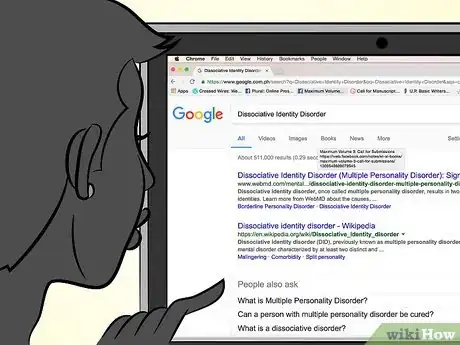



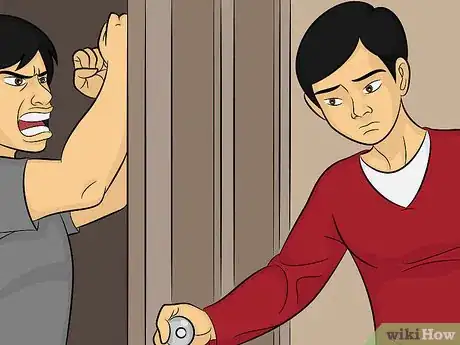
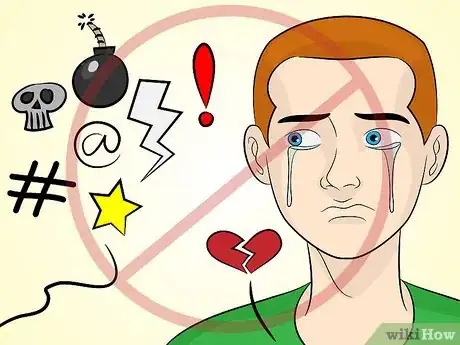
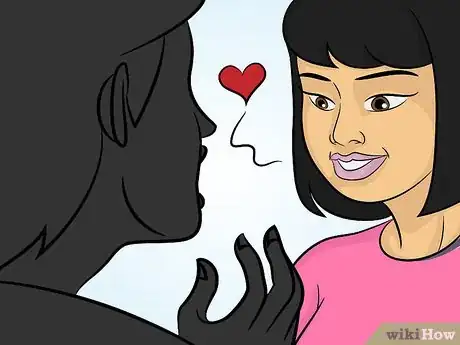

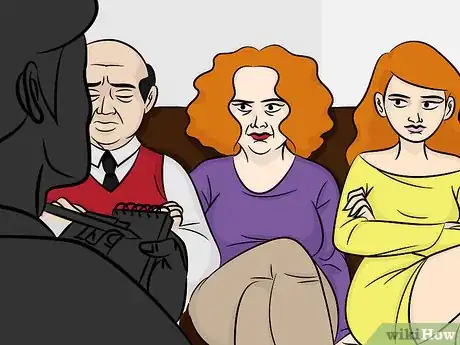
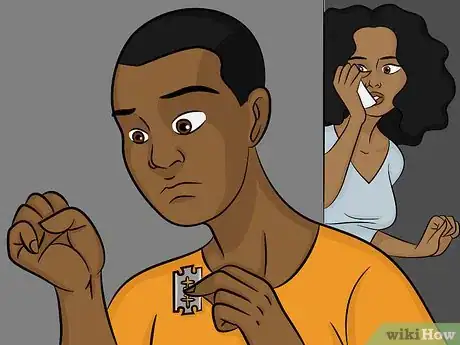



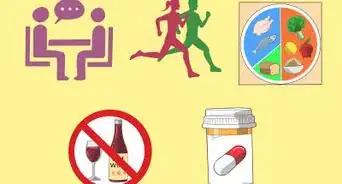





-Step-17-Version-2.webp)







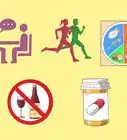







































Medical Disclaimer
The content of this article is not intended to be a substitute for professional medical advice, examination, diagnosis, or treatment. You should always contact your doctor or other qualified healthcare professional before starting, changing, or stopping any kind of health treatment.
Read More...